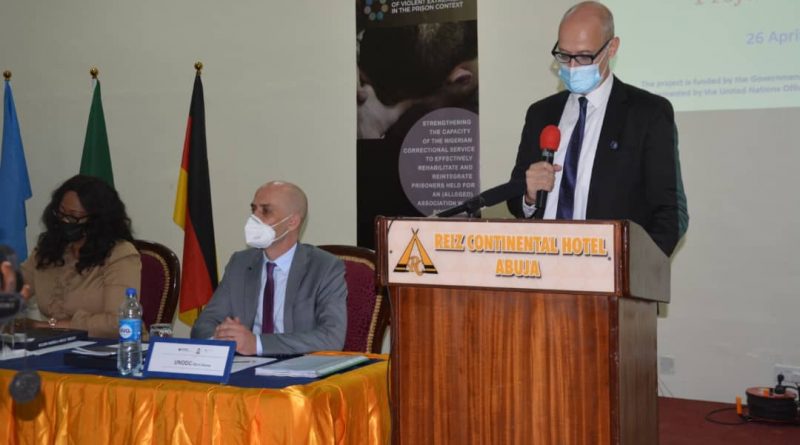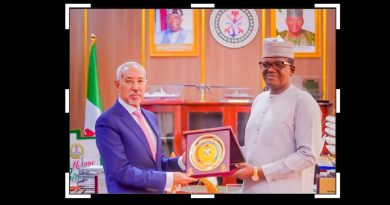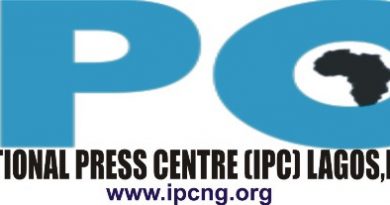UNODC Launches New Prison Reform Programme in Nigeria
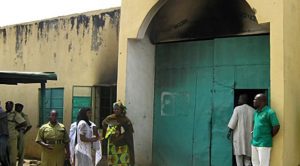
Oru Leonard
The United Nations Office on Drugs and Crime (UNODC), the Nigerian Correctional Service (NCoS) and the Government of Germany has launched a new project aimed at fostering the rehabilitation and social reintegration prospects of alleged Boko Haram (BH) associates in detention.
According to the spokesperson of UNODC, Ms Olivia Okorondu, the move is to sttrengthen the capacity of the Nigerian Correctional Service to effectively rehabilitate and reintegrate prisoners held for an (alleged) association with Boko Haram.
In his opening remark, the Acting Controller-General of the Nigerian Correctional Service, John Mrabure, stated, “it is heartwarming that this phase of support is geared towards strengthening the capacity of the Correctional Service to rehabilitate and reintegrate offenders alleged to be affiliated with terrorist organisations. There is no gainsaying that this intervention will go a long way in enhancing the technical depth and optimal functionality of the Service’s deradicalisation programme.
The Acting Director of the Administration of Criminal Justice and Reforms Department under the Federal Ministry of Justice, Leticia Ayoola-Daniels, concurred that adding that the initiative constitutes a major step forward in our collective goal to support the Nigerian Correctional Service in its efforts to comply with the core provisions of the Nelson Mandela Rules by improving prison security, safety and the humane treatment of inmates.
With its focus on Maiduguri Maximum Security Prison in Borno State, the project will target a region which continues to be particularly affected by the insurgency, including a severe impact on the correctional system. More than 1,200 suspected Boko Haram associates are currently held in Maiduguri Maximum Security Prison, the vast majority of whom continue to be held on remand. Next to the extended periods of pre-trial detention and poor socio-economic backgrounds, the stigma associated with being perceived to have been associated with Boko Haram aggravates the obstacles that these detainees will face when trying to re-build their lives in the community.
The project will therefore put an emphasis on strengthening the social reintegration prospects of this particular category of prisoners, including by enhancing their access to education, vocational training, recreational activities and other support services.
This aspect will be complemented by infrastructural support and capacity-building measures for corrections officers with a view to improve prison conditions and to further strengthen NCoS’ overall compliance with the United Nations Standard Minimum Rules for the Treatment of Prisoners (the Nelson Mandela Rules).
As such UNODC’s project will not only respond to the Abuja Declaration on the Treatment of Violent Extremist Offenders (2016), but also contribute to the practical application of the revised Nigerian Correctional Service Act (2019) and its “enhanced focus on corrections and promotion of reformation, rehabilitation and reintegration of offenders.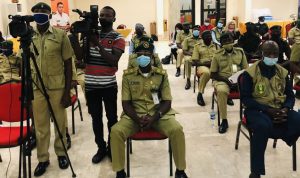
The Chairman of the Presidential Committee on Correctional Reform and Decongestion under the Federal Ministry of Justice, the Honourable Justice I.U. Bello, reiterated his support to the project “as it reinforces the current national advocacy for a paradigm shift from the traditional concept of prison administration.”
As part of UNODC’s Global Programme on Addressing Prison Challenges, the project will benefit from UNODC’s vast experience of providing technical assistance and advisory services to prison and correctional systems in more than 50 countries worldwide, including on the specialized topic of countering violent extremism in prison settings.
The Representative of UNODC’s Country Office in Nigeria, Oliver Stolpe, emphasized that “in our mission to ‘leave no-one behind’, we must not forget prisoners and those who are tasked with their custody and care. Today, we are sending a strong message that human rights need to be adhered to in prisons and that preparing prisoners for their release is an essential contributor to public safety and the cohesion of societies.”
The Executive Secretary of the National Human Rights Commission, Tony Ojukwu Esq, commended UNODC for working with the Government of Nigeria on this crucial topic and reiterated that “mainstreaming human rights standards in the rehabilitation and social integration of prisoners for alleged association with Boko Haram is imperative.”
Following the launch, UNODC proceeded with two capacity-building workshops for a total of 50 corrections officers from Maiduguri and NCoS Headquarters on the Nelson Mandela Rules and on

